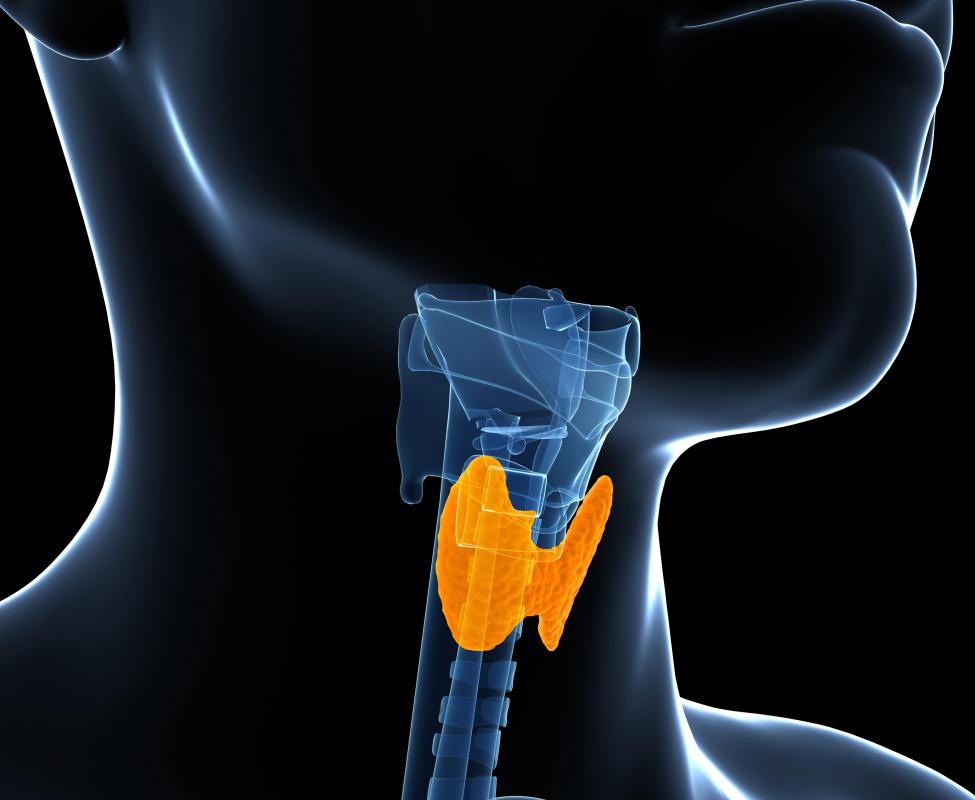At TheHealthBoard, we're committed to delivering accurate, trustworthy information. Our expert-authored content is rigorously fact-checked and sourced from credible authorities. Discover how we uphold the highest standards in providing you with reliable knowledge.
What Is the Difference between the Thalamus and Hypothalamus?
Thalamus and hypothalamus are both names of structures in the brain. While the hypothalamus is cone-shaped, the thalamus consists of two connected lobes, one located in each hemisphere. The hypothalamus regulates the body's vital metabolic processes, affecting temperature, blood pressure, hunger, thirst and sleep. It controls the endocrine system by affecting the pituitary gland's production of hormones. The thalamus takes information from a number of different areas of the brain and relays it to the cerebral cortex, the outer layer of gray matter where higher level brain functions take place.
In both structure and function, the thalamus and hypothalamus are quite different, but the names seem confusingly similar. The names are similar because hypo means under, and the hypothalamus was named for its position, which is below the thalamus. Both thalamus and hypothalamus are part of an area of the brain known as the diencephalon.

The function of the hypothalamus in maintaining the body's normal state is known as homeostasis. A person's weight, temperature, blood pressure and fluid balance are all regulated as part of this process. The hypothalamus receives information about different parts of the body via the nervous system, enabling it to stimulate changes that bring systems back into balance.

Information about factors such as blood pressure, the skin's temperature, gut fullness, and the concentrations of various substances in the blood is received by the hypothalamus, which may then activate the autonomic nervous system or the endocrine system. Through the autonomic nervous system, responses involving sweating, heart rate, digestion and narrowing of blood vessels can be used to alter the body's state. The hypothalamus controls the endocrine system through the pituitary gland, stimulating it to produce hormones that affect glands such as the thyroid and the adrenals. This allows it to alter metabolism, blood pressure and the release of adrenaline.

Both sensory, which means from the senses, and motor, or movement, information are relayed by the thalamus to the cortex. Sensations such as pain, information from the gut and emotions are all transmitted through the thalamus. Information regarding the sense of smell is different from that of the other senses, as it only reaches the thalamus after it has been received by the cortex. Circadian cycles, such as sleep wake cycles, are partly regulated by the thalamus. As the hypothalamus is also concerned with sleep wake cycles this is one area where input from both thalamus and hypothalamus is involved.
AS FEATURED ON:
AS FEATURED ON:

















Discussion Comments
There are conditions, like Prader Willi Syndrome, where abnormalities in genes directly affect the hypothalamus. People with this diagnosis don't have the ability to feel full and actually feel as if they're starving all of the time. Research and treatment are important for these people because it causes many medical issues and death.
Modified keto and Paleo diets have shown to slightly decrease appetites, but these people need to be constantly monitored around food. I hope they find treatment soon. My son needs it.
It's no wonder so many things can affect appetite, like sleep deprivation and blood sugar levels and gut fullness, when all those things are being controlled by the hypothalamus.
I hope they do find a way to tone it down a little bit without affecting the other things it does though. It would be great to have a reduced appetite when you need one.
@pleonasm - I don't think it's completely "normal" to crave food all the time, because there are plenty of people who don't. They don't abstain through will power, they abstain from gorging themselves because they don't feel like food right now.
There are people who feel like that who are still overweight too, because when they do feel hungry, they eat processed foods that provide more energy than they really needed. If they could substitute some of those for less energy dense foods, they'd be fine.
At any rate, it isn't so simple that the hypothalamus just makes you hungry all the time and scientists are looking for a switch to turn it off. If it was that simple, they'd have done it ages ago.
I know that there has been a lot of research into the ways that that hypothalamus controls appetite.
Because, of course, if they could manage to find an effective way of keeping appetite down, the obesity epidemic would no longer be an issue.
The difficulty is that it is normal to be hungry, because our ancestors had to take advantage of food when they could get it. Their intake was controlled by the fact that they didn't have unlimited food supplies like we do.
So, treatment for what gets called a disease involves changing something that is actually quite normal in human beings. I'm not saying they shouldn't do it, just that it should be recognized for what it is.
Post your comments